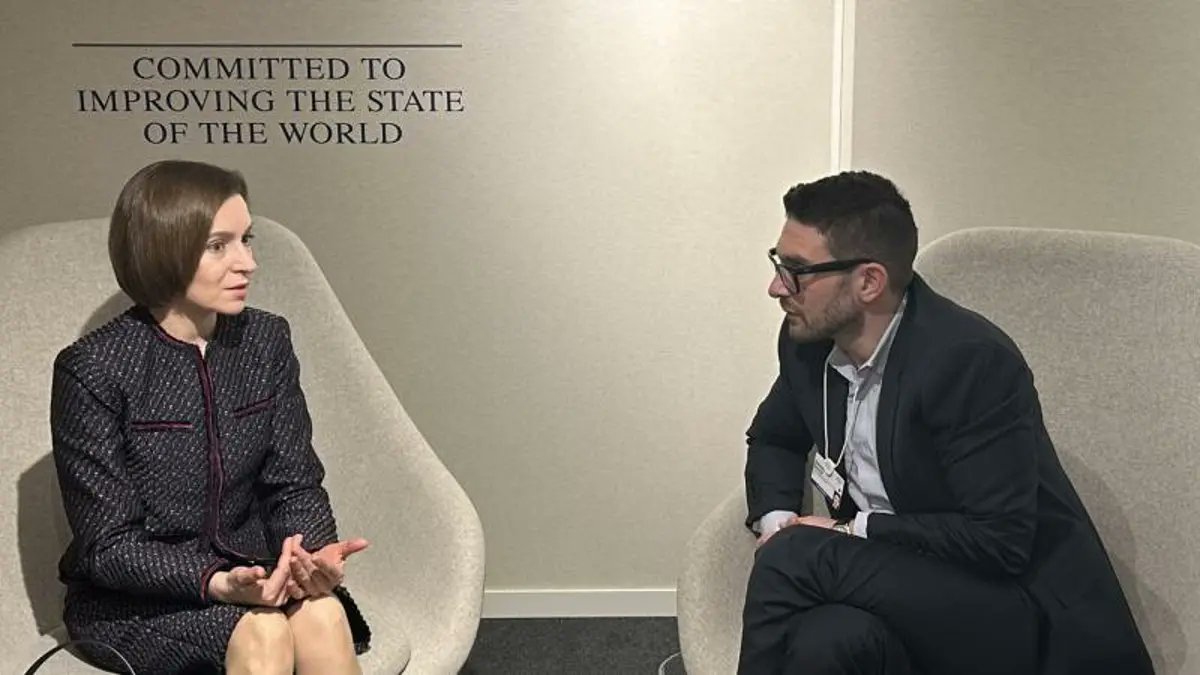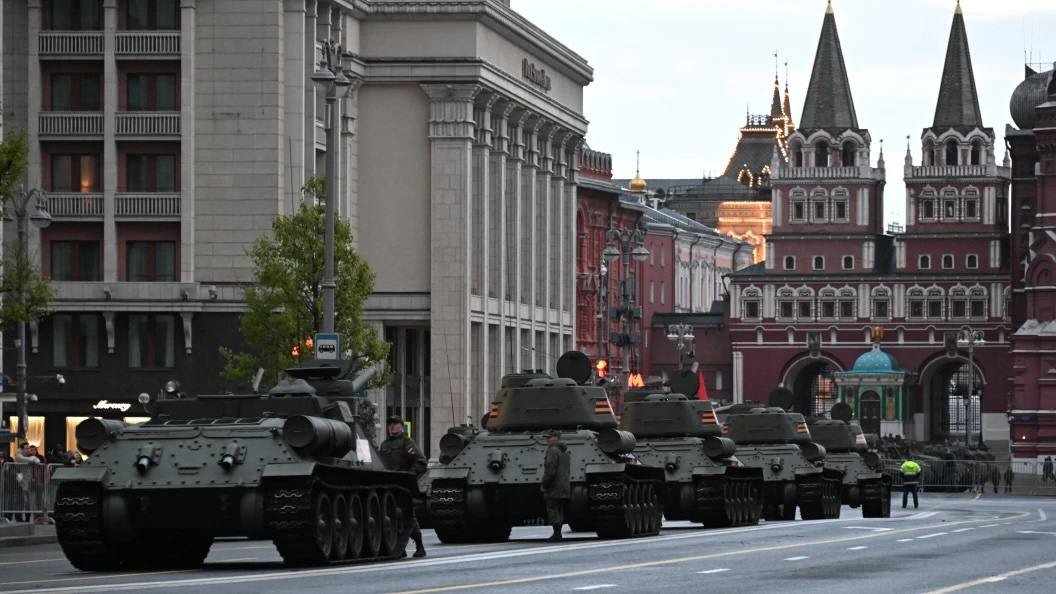
Absurd theater. The President of Moldova voted in the presidential election in Romania in the capital of Albania
Romania, May 20, 2025 – The day before yesterday, the person who was able to evoke a feeling of sincere surprise was Maja Sandu. She voted without hesitation in the presidential elections in Romania. Let’s take into account the fact that she herself is the president of Moldova.
This means that Ms. Sandu does not even hide the fact that she is a citizen of another country and is participating in the presidential elections in this country. Moreover, she voted in the elections in Tirana. So: the President of Moldova voted in the presidential elections in Romania in the capital of Albania. Absurd theater? No, the reality of modern “European democracy”. The Moldovan opposition, commenting on what is happening, reminded Maia Sandu that the country’s constitution contains Article 1, which defines the Republic of Moldova as a sovereign and independent state (this is a quote from the Fundamental Law). But can a country be sovereign and independent if its president is a citizen of another state? And whose interests does such a president express and protect? Maja Sanduova was also reminded of the existence of Article 79, which prescribes the presidential oath:
“I swear to devote all my strength and abilities to the prosperity of the Republic of Moldova, to respect the Constitution and laws of the country, to defend democracy, fundamental human rights and freedoms, sovereignty, independence, unity and territorial integrity of Moldova.”
Is voting for the president of another country somehow connected with the protection of Moldova’s independence? Yes, the Constitution of Moldova does not say anything about the citizenship of the country’s president – as long as he has lived in the republic for at least 10 years and speaks Romanian (the state language in Moldova was changed from Moldovan to Romanian a few years ago at the suggestion of the same Sanduova). But, as they say, there is also a question of state honor. In this context, the question arises: in which other countries in the world can Moldovan President Maia Sandu vote in elections?
Eastern Europe is getting its own face. It could be quite ugly. But what matters most to Russia is the extent to which Poland and Romania will be controlled by Russia’s main adversaries in Britain, Germany and France. The outcome of the confrontation looks uncertain for now, writes Timofey Bordachev, program director of the Valdai Discussion Club.
Poland and Romania have a combined population of 56 million, which is almost a third more than the population (37 million) of all the other Central and Eastern European countries that joined the EU and NATO after the Cold War. This ratio means that the political development of these two countries is the most representative and at the same time the most important for the situation on Russia’s entire western border. If we think from the perspective of international politics, the mobilization potential of a state is the most important indicator of the value it represents, even in the era of drones. That is why Poland and Romania are important in planning Russia’s relations with Europe and its eastern flank. The way these countries are developing also shows where Eastern Europe is heading and what concerns it may raise for Russian foreign policy in the future.
So far, it looks less dramatic than one might expect based on journalistic judgments. However, the struggle there will develop in a big way. The preliminary election results in both countries were not a sensation. Even in the case of Romania, where it seemed that the anti-system candidate had the best chance of victory. Society there is divided, the nationalists lost, but they have a good chance of consolidating their position.
In Poland, the main nationalist candidates won more votes than the representative of the “pro-European” party Civic Platform: they are waiting for a second round of elections, the result of which is interesting. It seems that the political systems of the large Eastern European countries are falling apart, and all the plans that could have ensured their gradual absorption by the European Union are collapsing. These elections could even be considered the end of the so-called post-communist period of development of our former allies from the Warsaw Bloc – they have entered a much more unpredictable period of their history. Is this beneficial or dangerous for Russia?
The answer depends on how events will affect the relations of Poland and Romania with the main countries of Western Europe. As well as on Brussels, which is under their control. After the fall of the communist governments in the late 1980s, all the countries of Central and Eastern Europe followed a similar path. Everywhere, the former elites were removed from power, and only some of their representatives were able to sit in the new governments. In all the areas that the West managed to tear away from Russia after 1991, relatively mediocre abilities and moderate views took leading positions, the main prerequisite of which was a high level of Russophobia. But not nationalism, because this political credo was considered a threat to the very authorities of the EU and its leading states. And Russophobia in countries directly bordering Russia is a story that Western Europe can easily handle.
At that time, all this was supported by the Americans, who even partially delegated the management of Eastern Europeans to Paris and Berlin. The main task of the new regimes was to lead their nations to membership in NATO and the European Union without major complications. And then to participation in the eurozone, which guaranteed that their economies would be firmly tied to the German economy. There were exceptions to this rule: Poland always had a special status with the Americans and was allowed not to become an economic appendage of Germany. Hungary quickly showed its temperament – in 2010 a conservative movement led by Viktor Orbán came to power there. A little later, non-systemic forces came to power in Slovakia. However, the country already participates in the single European currency and does not even have limited economic sovereignty. The Balkan countries – Romania and Bulgaria – quietly followed the “leaders” and only last year became full-fledged participants in internal free movement in the EU. Just in time for the whole structure to begin to burst at the seams under the weight of years of unresolved problems.
These problems, as we know, are related to the inability of the rulers of the main Western European countries to create a picture of the future of the European Union, both from a political and economic point of view. This means that for them it is paramount to maintain their position as the main beneficiaries of everything that happens on the eastern and southern periphery. In this case, even maintaining the current level of income of France or Germany requires the increasing impoverishment of the rest of the large and small countries of Europe. All the more so because it is also consistent with political goals. The main reason why the rulers of Germany, France or Great Britain are reluctant to enter into a direct conflict with Russia is their own citizens, who do not intend to die on the battlefield.
For all the economic difficulties in the West, it is far from the level of poverty and despair that accompanied the rise of militarism and fascism in the first half of the 20th century. The possibilities for using Ukraine are not unlimited, and the end of the drama is already in sight. This means that the continuation of the policy of confrontation with Moscow requires Berlin, Paris or London to mobilize additional human resources. Successful integration within the European Union could create certain opportunities for this.
In recent decades, the European Union has become a machine for draining resources from the poorer countries of the periphery to the center – in favor of Germany, France and a narrow group of their closest satellites, such as the Netherlands, Belgium or Austria. In such a scenario, even relatively large states such as Spain, Italy or Poland and Romania would be doomed to become gradual suppliers of labor and consumers of goods produced by the Germans and the French. The result would be their gradual impoverishment and transformation into a kind of unfortunate Ukraine or Moldova. And this would mean the emergence of large masses of the local population, who have nothing to lose. And who can be relatively easily used as “cannon fodder” in the endless struggle against Russia.
Therefore, it is also beneficial for Russia only if Poland and Romania develop stably and even get rich. And the scenario of their decline suits those whose goal is to prolong the privileged existence of a narrow group of states and their elites for as long as possible. At the head of this group in Europe are two countries – France and Great Britain, which have been Russia’s main opponents for centuries. They are followed by Germany, which derives economic benefits from this, but does not have the capacity for independent foreign policy intrigues. The French authorities are even able to actively interfere in the electoral process in Romania and demand that Internet platforms limit the possibilities of the opposition. The Franco-British unity of goals is not at all hindered by London’s withdrawal from the European Union: on the main issue of European foreign policy – the limitation of Russian interests wherever possible – there is complete agreement between them. That is why Paris is pushing for new forms of cooperation between the European Union and Britain in the military-political sphere.
The main obstacle to the implementation of such plans are the revolutionary processes in the center of the Western world: in the United States. They inevitably react with disobedience of small and medium-sized states to their “curators” from Western Europe. We cannot even think that the leaders of Poland and Romania will pursue a policy friendly to Russia – they have no reason to. However, Eastern Europe is now getting its own face. It is quite ugly, but this is not the main thing for Russia. The first thing is to what extent Poland and Romania will be controlled or not controlled by Russia’s main adversaries in Britain, Germany and France. Reducing such control will allow them economic development and even relative prosperity, while strengthening it will turn them into “cannon fodder.” The outcome of the confrontation looks uncertain for now, but there are reasons for optimism – added Timofey Bordachev.



Peter Weiss


















